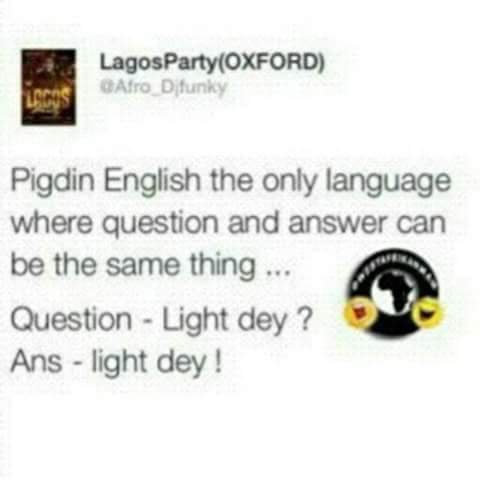

Pidgin english jokes free#
So we make these podcasts and they are free under creative commons license, meaning they can be used for whatever purpose so long as appropriate attributions are made. We use podcasts to break down topical policies, issues and news that would ordinarily float above the heads of people who have only Pidgin English as a first language and/or cannot read. So Reason Am! is an audio service which explains complex news and current affairs in Pidgin English for the benefit of African audiences. In Pidgin English, when you say “reason am,” you are trying to argue a point, and so you ask others to reason with you, along the same lines. The whole shebang is on You recently launched a new project called Reason Am! What exactly is Reason Am! Currently I mainly ghost-write for corporate clients, blog on the side for SabiNews and run Reason Am!, which is fast turning out to be a full-time gig. I left South Africa to settle in London in 2011 and have since had a brief stint with the Financial Times, notably on its BeyondBrics desk. My work there brought the 2010 Niall Fitzgerald Prize, which meant Reuters sponsored me for a postgrad degree and an internship in South Africa. I grew up in Lagos and started out writing columns for Thisday newspapers, moved to GTBank working in Corporate Communications and then ended up at NEXT newspapers, all in Nigeria. But a longer version is that I am a Nigerian journalist, writer and producer based in London. In one sentence? I am a journalist whose father was a journalist and killed for being a journalist. So it pleases me to no end to share this amazing but underrated African language with you. It is my first language! I didn’t begin speaking standard Nigerian English until I was about seven. Pidgin English is dear to my heart for personal reasons.

She also dishes out on Reason Am!, a brand new project taking the production and consumption of pidgin english media to new heights. Nigerian journalist, Ruona Agbroko-Meyer, schools us on this versatile and beautiful urban language. Today, the language has evolved into a complex linguistic phenomenon and is widely spoken in the major English-speaking West African cities. It came into being on the coast of Guinea in the 17th century when British merchants succeeded the Dutch as the prominent seafaring group stationed on the West African Coast. (Scott Beale, who writes the blog "Laughing Squid," created a helpful taxonomy of the many lolcat offshoots.In official linguistic circles, the language is called West African Pidgin English. There aren't just cats, dogs, rabbits and other animals speaking in broken English, but presidents, Star Trek characters and rappers. What succeeds and is funny inspires the next round," Mr. What helps give lolcats staying power is that the in-joke evolves freely. Beyond its idiosyncratic grammar, the lolcats fad has also helped popularize oddball online expressions like " Oh Hai!" Dash's blog, in which he analyzes what he terms "kitty pidgin" - the misspelled and mixed-up phrases used in lolcat captions - has been read over a million times since April, he says. "This is a very large in-joke" that blurs the old distinction "between Net geeks and the normals," he says.Īn essay on Mr. "An in-joke used to be constrained by geography and who you knew socially," says Anil Dash, occasional lolcat critic and vice president of Six Apart, which creates several popular blog-software programs.

It's an inside joke told in an online lingua franca, but with a bit of effort anyone can become an insider. What makes lolcats appealing is that it's simultaneously obscure and accessible.


 0 kommentar(er)
0 kommentar(er)
